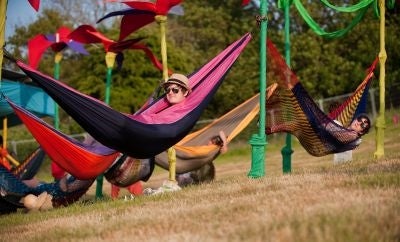Need a nap? Get a hammock, a study suggests

Want better sleep? Consider a hammock. A new Swiss and French study reveals that gentle swaying back and forth while sleeping provides a better, deeper snooze.
Neuroscientists from the University of Geneva rigged up a bed so it would sway gently from side to side every four seconds. A dozen men then took afternoon naps on the bed for 45 minutes while electrodes recorded brain activity. During another nap, they slept on a stationary bed.
The results, published in journal Current Biology on June 21, revealed that subjects on the rocking bed fell asleep faster, around three minutes sooner or 30 to 40 percent faster than the static bed. But what's more interesting is that the rocking sleepers slept better, enjoying a deeper, high-quality sleep, said researchers Sophie Schwartz and Michel Mühlethaler in a statement.
Subjects on the rocking bed spent about 30 percent longer in what's called "N2" sleep, the deepest stage you reach in a nap. Plus the quality of N2 sleep improved too, "as shown by a higher density of brain activity bursts called spindles," noted the researchers. Spindles have been linked with the ability to remember new information.
The researchers added that the research could impact stroke recovery and brain injury treatment, and they are hoping to try the rocking bed on night-time sleepers as a possible cure for insomnia or other sleep ailments.
Meanwhile, here are a few tried-and-true tips to getting a better night's rest from health information website WebMD:
1. Cut caffeine - the effects of caffeine can take as long as eight hours to wear off.
2. Avoid alcohol as a sleep aid - it may initially help you fall asleep, but it can also lead to less-than-restful sleep.
3. Relax before bedtime - create a pre-sleep ritual, such as light stretching or a hot bath, to help you unwind from the day.
4. Exercise - regular exercise, usually in the mornings or afternoons, can help you sleep like a baby.
5. Keep your bedroom dark, quiet, and comfortable.
To access the study: http://www.cell.com/current-biology/fulltext/S0960-9822%2811%2900539-2
Join our commenting forum
Join thought-provoking conversations, follow other Independent readers and see their replies
Comments
Bookmark popover
Removed from bookmarks